Featured
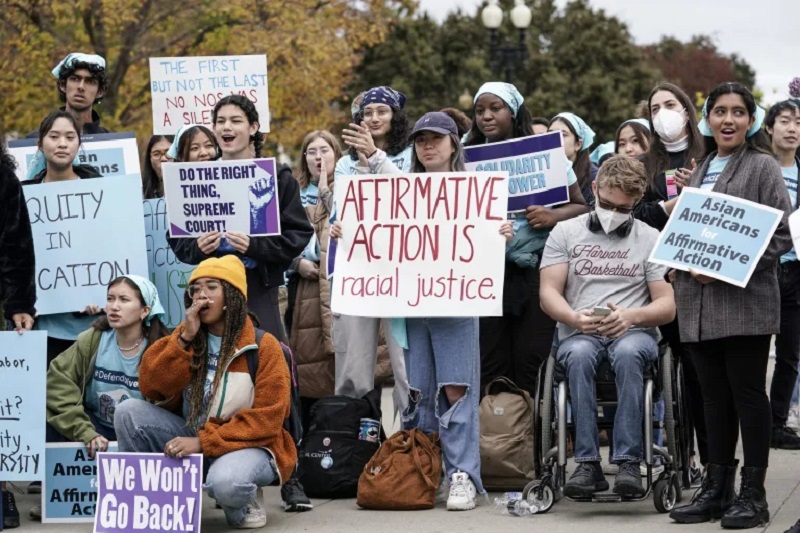 Most Americans say colleges should be able to use affirmative action in admissions, but race should play a small role, new poll shows. By Collin Binkley, Emily Swanson and The AP / Fortune
Most Americans say colleges should be able to use affirmative action in admissions, but race should play a small role, new poll shows. By Collin Binkley, Emily Swanson and The AP / Fortune
The May poll from The Associated Press-NORC Center for Public Affairs Research found that 63% say the Supreme Court should not block colleges from considering race or ethnicity in their admission systems. The poll found little divide along political or racial lines.
The poll reflects general support for affirmative action even as the future of the practice remains in doubt. The Supreme Court is expected to rule soon on lawsuits challenging admissions systems at Harvard and the University of North Carolina. With a conservative majority on the court, many college leaders are bracing for a decision that could scale back or eliminate the use of race in admissions. Read more
Related: He protested affirmative action in college admissions. He has regrets. By Olivia Sanchez / USA Today
Political / Social
 Ron DeSantis says he will ‘destroy leftism’ in US if elected president. By Martin Pengelly / The Guardian
Ron DeSantis says he will ‘destroy leftism’ in US if elected president. By Martin Pengelly / The Guardian
Predicting two terms in the White House should he defeat Donald Trump for the Republican presidential nomination next year, Ron DeSantis said he would go on to “destroy leftism in this country”.
“I will be able to destroy leftism in this country and leave woke ideology in the dustbin of history,” the Florida governor told Fox News. Read more
Related: Nicolle Wallace Literally Laughs Out Loud At Ron DeSantis’ Bizarre Promise. By Ed Mazza / HuffPost
 The debate around DEI has got it all wrong. By Maureen Dunne / Salon
The debate around DEI has got it all wrong. By Maureen Dunne / Salon
Why confusing the issues around inclusivity hurts everyone
The culture wars have taken a wrong turn. Last week, just ahead of announcing a run at the Republican Presidential nomination, Florida Gov. Ron DeSantis signed a bill seeking to eradicate DEI programs and critical race studies (CRT) in public universities statewide. Positioning himself as a champion of American values battling against a “woke mob” determined to undermine them, he explained his position to a roundtable back in March: “I believe that state universities should be focused on teaching students how to think, not what to think.” Platitudes aside, the irony should be lost on no one: DeSantis is talking about freedom of thought while advocating for state-mandated censorship. Read more
Related: Chick-fil-A sparks anti-woke outrage for hiring VP of DEI. By Ariel Zilber / New York Post
The National Association for the Advancement of Colored People’s (NAACP) travel advisory for the state of Florida comes as a direct warning to individuals, particularly those from marginalized communities, about the potential risks they may face while visiting or residing in the Sunshine State.
 The Rise of Latino White Supremacy. By Geraldo Cadava / The New Yorker
The Rise of Latino White Supremacy. By Geraldo Cadava / The New Yorker
At a time of rising racial violence, Latinos are potential perpetrators and potential victims.
Scholars and journalists have described these Latino white supremacists in different ways. Some Latinos, they’ve argued, are also afflicted by “aspirational whiteness,” or the desire to be white in order to fit into the racial and capitalist order of the United States, to avoid the discrimination that Black Americans experience, or to justify the pursuit of individual wealth and belonging. They ascribe to “multiracial whiteness,” which the political scientist Cristina Beltrán defines as an identity that people from all racial backgrounds can participate in. Read more
 He prosecuted George Floyd’s killer — and he’s still searching for answers. By Shia Kapos / Politico
He prosecuted George Floyd’s killer — and he’s still searching for answers. By Shia Kapos / Politico
Minnesota Attorney General Keith Ellison discusses policing, politics and how to prevent cops from killing more people.
Ellison led the prosecution of Derek Chauvin, the disgraced Minneapolis police officer who murdered George Floyd three years ago. The prosecutor came away from the trial with reams of notes and a hunger to understand what led to Floyd’s death — and how to prevent it from happening again. “It seems like no Minnesotan and no American can deny that there is a real problem when it comes to policing in some communities, especially concerning Black people,” Ellison, who is Black, said in an interview with POLITICO this month. “There was a time when I think we could say, ‘Well, that happened once.’ Or maybe, ‘There are two sides to a story.’ But once you’ve seen what happened to George Floyd, you can’t say it’s not a serious problem.” Read more
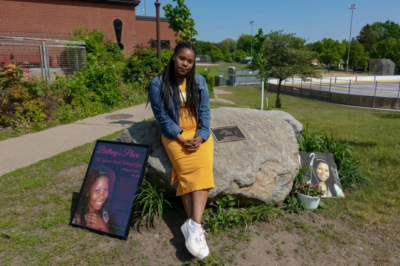 Minnesota sets up first office for missing and murdered Black women and girls. By Dana Ferguson / NPR
Minnesota sets up first office for missing and murdered Black women and girls. By Dana Ferguson / NPR
Illinois and Wisconsin have followed Minnesota in implementing task forces to look into disparities around violence against Black women and girls. But this year, Minnesota enacted a law creating the nation’s first Office of Missing and Murdered African American Women and Girls.
Much like offices around the country designed to find Indigenous women and girls, Minnesota’s office will investigate cold cases and reopen cases where Black women or girls were declared to have died by suicide or drug overdose if the situation was suspicious. It will also assist police agencies and community groups in active cases and serve as a new point of contact for those reluctant to speak with police. Read more
 The Elusive Quest for Black Progress. By Matthew Thompson / NYT
The Elusive Quest for Black Progress. By Matthew Thompson / NYT
Many measures of Black achievement in the U.S. have stalled or reversed. A series from Headway looks back at historical gains for their lessons today.
Life expectancy is one of the oldest and surest indicators we have of both human suffering and human progress. I have been staring for months at a graph of life expectancy for Black and white Americans from 1900 to 2017. It tells a story of persistent, if uneven, progress in closing the gap between these groups; it began to reach a promising convergence in the 2010s. Then, the Covid pandemic began. Life expectancy plunged, and graphs of its decline started going viral. Decades of progress in extending human lives have been reversed. Life expectancy for Black and white Americans has diverged again, falling back to where it was in 1995. A gap of nearly five years of expected life now separates us. Read more
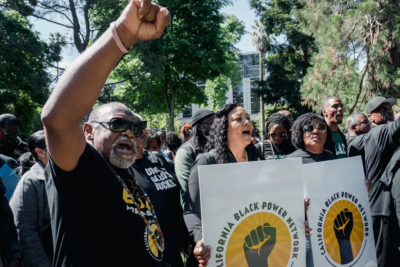 Reparations Are a Financial Quandary. For Democrats, They’re a Political One, Too. Trip Gabriel, Maya King, Kurtis Lee and
Reparations Are a Financial Quandary. For Democrats, They’re a Political One, Too. Trip Gabriel, Maya King, Kurtis Lee and
What should Americans pay for the legacy of slavery and a century of Jim Crow segregation? For decades, the question was mostly academic. Then it was seized on by Democrats and activists during a time of racial re-examination after the murder of George Floyd in 2020, and a number of cities and states set up commissions to study reparations to Black Americans. Now, as those commissions announce their recommendations, the political climate is far different from just three years ago. A widespread “anti-woke” movement on the right has targeted programs aimed at social and racial justice, and the hard-cash figures being proposed as reparations are causing sticker shock. Read more
Ethics / Morality / Religion
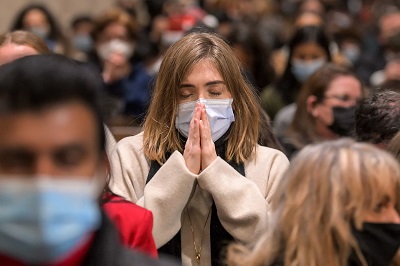 Young people aren’t buying far-right religious beliefs. By Serene Jones / RNS
Young people aren’t buying far-right religious beliefs. By Serene Jones / RNS
Younger Americans aspire to build a world marked by love and justice. But they don’t see much of that in church.
Far-right politicians and influencers are on a rampage to impose their views on all Americans. They’re pushing for book bans, unfettered access to guns, anti-LGBTQ+ legislation, abortion restrictions and more — all in the name of “God.” These sorts of hate-filled biblical interpretations might appeal to politicians’ bright-red bases. But overwhelmingly — at the ballot box and beyond — young people are showing us that they will not buy into them. Read more
 Georgetown Reconciliation Fund announces first grant recipients. By Nate Tinner-Williams / NCR
Georgetown Reconciliation Fund announces first grant recipients. By Nate Tinner-Williams / NCR
The inaugural recipients have been selected for Georgetown University’s new Reconciliation Fund, meant to support programs benefiting descendants of those once enslaved by Jesuits in Maryland. The first round of semester-based payouts, announced on April 28, total $200,000.
The five projects are based in Maryland and Louisiana, the latter being where 272 enslaved African Americans were infamously sold in 1838 to shore up the finances at Georgetown, the nation’s first Catholic university. They include a housing nonprofit, mental health services, descendant community outreach initiatives, and youth educational programs. Read more
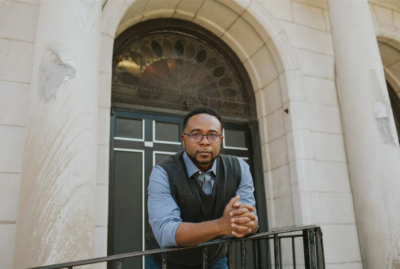 How evangelical Christian writer Jemar Tisby became a radioactive symbol of ‘wokeness.’ By Bob Smietana / RNS
How evangelical Christian writer Jemar Tisby became a radioactive symbol of ‘wokeness.’ By Bob Smietana / RNS
Once an evangelical insider with a textbook conversion story, Tisby has become persona non grata in some Christian circles for his books on race and religion, including the 2019 bestseller, ‘The Color of Compromise.’
Over the past decade, Jemar Tisby’s life has largely been shaped by two forces: the Bible, and the deaths of young Black men, often at the hands of law enforcement. About a decade ago, Tisby, then a seminary student in Jackson, Mississippi, helped start a new group called the Reformed African American Network — an offshoot of the “Young, Restless, and Reformed” movement that had spread like wildfire among evangelical Christians in the first decade of the 21st century. Read more
 How the practice of Nichiren Buddhism sustained Tina Turner for 50 years. By Ralph H. Craig III / The Conversation
How the practice of Nichiren Buddhism sustained Tina Turner for 50 years. By Ralph H. Craig III / The Conversation
When Tina Turner, often dubbed the “Queen of Rock ‘N’ Roll,” died at her home in Küsnacht, Switzerland, on May 24, 2023, at the age of 83, media headlines praised both her dynamism as a performer and her many career achievements. What many did not know is that for the past 50 years Turner had practiced Soka Gakkai International Nichiren Buddhism. Turner’s Buddhist practice developed initially against the backdrop of her first marriage and continued throughout her solo career. It provided inspiration for some of the final projects of her career. Read more
Historical / Cultural
 Black people may have started Memorial Day. Whites erased it from history. By Donald Beaulieu / Wash Post
Black people may have started Memorial Day. Whites erased it from history. By Donald Beaulieu / Wash Post
An 1865 photo of the graves of Union soldiers who were buried at the racecourse in Charleston, S.C., during the Civil War. (Library of Congress)
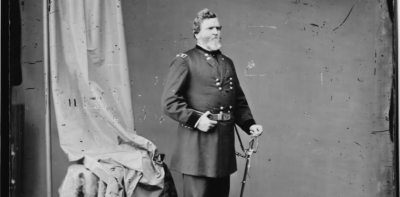 US Army Maj. Gen. George H. Thomas’ journey from enslaver to Union officer to civil rights defender. By Christopher Justin Einolf / The Conversation
US Army Maj. Gen. George H. Thomas’ journey from enslaver to Union officer to civil rights defender. By Christopher Justin Einolf / The Conversation
As an adult, I read more widely about the Civil War and became fascinated with Union Maj. Gen. George H. Thomas, who grew up in Virginia but joined the Union army. I’m a sociology scholar today. But, as a student of historical sociology, I researched and wrote a biography of Thomas to understand his decision.
Once a racist enslaver, he distinguished himself after the war in his active protection and promotion of the rights of formerly enslaved persons. Thomas stands today as an example of the thousands of white Southerners who supported the Union during the Civil War and a rare example of a slave owner who changed his views on race and slavery. His military career demonstrated skill and bravery, but his true heroism was a moral one. Read more
 How Greenwood Grew a Thriving Black Economy. By Victor Luckerson / NYT
How Greenwood Grew a Thriving Black Economy. By Victor Luckerson / NYT
W.E.B. Du Bois saw the key to Black prosperity in places like Tulsa, where Black residents patronized Black stores. Even today it serves as a model.
What grabbed Du Bois’s attention was what his people were accomplishing despite it. “One notes all through the south, with some exception, the new hope and power of the colored folk,” he wrote in his diary. “It is not any increased faith in the white people — quite the contrary — it is a distinct sense of their own ability.” Greenwood represented this “new hope and power” better than almost any other place in the country. At the start of 1921, the 11,000-person enclave was ascendant. The district counted at least 15 doctors, a dozen tailors, seven attorneys, a jeweler, a garment factory and a skating rink among its more than 150 businesses. Read more
Related: The Trauma and Resilience of Tulsa’s Greenwood District. By Karlos K. Hill / The Nation
Related: Tulsa race massacre: No longer a riot, now comes the reckoning. By Camille Fine / USA Today
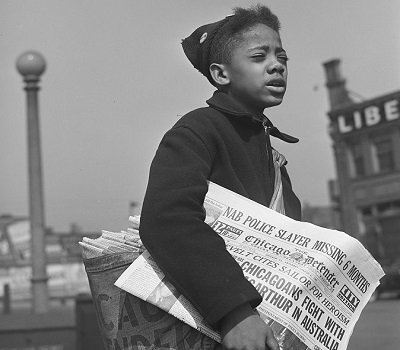 The Defender and Chicago’s Built Environment. By Ray Dinsmore / AAIHS
The Defender and Chicago’s Built Environment. By Ray Dinsmore / AAIHS
Newsboy selling Chicago Defender newspaper, Chicago, April 1942 (Library of Congress)
In A House for the Struggle: The Black Press and the Built Environment in Chicago, author E. James West explores the dialectical relationship between Chicago’s famed Black press and the physical locations their writing, activism, and community development took place. As a lecturer in Interdisciplinary Societies and Cultures at University College London and the co-director of the Black Press Research Collective at Johns Hopkins University, West sits at a unique nexus of expertise that allows him to explore the traditionally distant traditions of architectural history and the history of print culture. Read more
 From its birth 50 years ago, hip-hop has spread throughout Europe and challenged outdated ideals of racial and ethnic identity. By Armin Langer / The Conversation
From its birth 50 years ago, hip-hop has spread throughout Europe and challenged outdated ideals of racial and ethnic identity. By Armin Langer / The Conversation
His name is Alpha Diallo, and in his 2016 song “I am at home,” the French rapper makes clear who and what he is.
“I am Black,” he sings, “Proud to be French of Guinean origin.” Known as Black M, Diallo, 38, is one of many African, Caribbean and Middle Eastern immigrants throughout Europe who use hip-hop to advance racial and economic justice. In doing so, they are keeping their music in tune with rap’s American origins. The genre emerged in 1973 out of the anger and pain within Black American communities such as in the South Bronx, New York. Read more
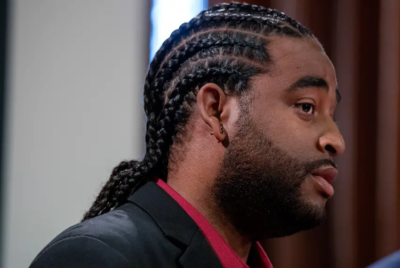 Abbott signs into law CROWN Act banning race-based hair discrimination. By Alejandro Serrano / The Texas Tribune
Abbott signs into law CROWN Act banning race-based hair discrimination. By Alejandro Serrano / The Texas Tribune
Gov. Greg Abbott over the weekend signed into law a bill prohibiting race-based hair discrimination in Texas workplaces, schools and housing policies. It goes into effect in September.
House Bill 567, introduced by Democratic Rep. Rhetta Bowers of Rowlett, sailed through both chambers of the Legislature with overwhelming support after the same bill stalled during the legislative session in 2021. The policy, which Abbott signed Saturday, will go into effect Sept. 1. Twenty states have passed the CROWN Act — an acronym for Creating a Respectful and Open World for Natural Hair, according to the CROWN Coalition, an organization that champions the legislation. Harris County, the state’s most populous, and the city of Austin have adopted versions of the legislation. Read more
Sports
 2023 NBA Finals In Miami Amid NAACP Travel Advisory In Florida. By Bruce C.T. Wright / NewsOne
2023 NBA Finals In Miami Amid NAACP Travel Advisory In Florida. By Bruce C.T. Wright / NewsOne
The bad news for the Sunshine State — aside from the ongoing “woke” culture wars waged by the Republican-led legislature — is that when the 2023 NBA finals aren’t in Denver against the Nuggets, they’ll be in a state where the NAACP has particularly advised Black people against traveling. The collision of those two truths is placing a brightening spotlight on the NAACP travel advisory. But it is also drawing attention to the Heat’s and Nuggets’ mostly Black players competing for the most coveted basketball title in the world that could possibly be won in a state that continues working to silence if not flat-out erase the history of people who look like them. Read more
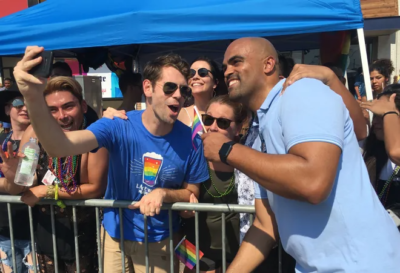 Ex-NFL player Colin Allred hopes football past helps topple Ted Cruz. By Mike Freeman / USA Today
Ex-NFL player Colin Allred hopes football past helps topple Ted Cruz. By Mike Freeman / USA Today
Allred played for the Titans from 2006-2010 and he was like so many players in the NFL. Not a star, but the lifeblood of the league, someone who played with talent and grit, but you didn’t see him in ESPN highlight packages.
Can Allred beat Cruz? “…In Allred, they now have a serious candidate,” writes FiveThirtyEight.com. “The former NFL player was first elected to Congress in 2018, when he defeated an 11-term incumbent by 7 points in a historically Republican district in the Dallas suburbs. He won reelection by 6 points in 2020 before redistricting placed him in a new, dark-blue district for 2022.” So, can he win? What is definite is that Cruz will face someone hardened and seasoned by NFL life, and that makes Allred a vastly different opponent, and perhaps a highly formidable one. “Ted Cruz doesn’t represent the Texas that I know,” Allred said. Read more
 Scottie Pippen: Michael Jordan was ‘horrible player’ and ‘horrible to play with,’ says former Chicago Bulls teammate. By Ben Morse / CNN
Scottie Pippen: Michael Jordan was ‘horrible player’ and ‘horrible to play with,’ says former Chicago Bulls teammate. By Ben Morse / CNN
“I’ve seen Michael Jordan play before I came to the Bulls. You guys have seen him play … He was horrible to play with. It was all 1-on-1, shooting bad shots. All of a sudden, we become a team and we start winning. Everybody forgot who he was. He was a player who was really not at the top of his category. It was scoring.”
Shortly after the release of “The Last Dance,” Pippen said he “was nothing more than a prop” in the 10-part docuseries. “They glorified Michael Jordan while not giving nearly enough praise to me and my proud teammates,” Pippen wrote in his memoir, ‘Unguarded.’ “Michael deserved a large portion of the blame. The producers had granted him editorial control of the final product. The doc couldn’t have been released otherwise. He was the leading man and the director. Read more
 The outsized world of James Wood. By Jesse Dougherty / Wash Post
The outsized world of James Wood. By Jesse Dougherty / Wash Post
The Washington Nationals’ top prospect is a 6-foot-6 outfielder carrying massive expectations.
Even if the sport wasn’t built for an outfielder his size, the Nationals’ rebuild should have plenty of room. At the end of Wood’s first professional season in 2021, he had essentially cut his strikeout rate in half, an almost impossible feat for a player who bypassed college. All spring, members of the Nationals’ front office have raved about his plate discipline and feel for the strike zone. And if it didn’t feel so reductive to connect Wood to the star he was traded for, here is where you would point out the similarities to a young Juan Soto, who debuted for Washington at 19 and never looked back. Read more
Site Information
Articles appearing in the Digest are archived on our home page. And at the top of this page register your email to receive notification of new editions of Race Inquiry Digest.
Click here for earlier Digests. The site is searchable by name or topic. See “search” at the top of this page.
About Race Inquiry and Race Inquiry Digest. The Digest is published on Mondays and Thursdays.
Use the customized buttons below to share the Digest in an email, or post to your Facebook, Linkedin or Twitter accounts.
 Beyond Florida: Other States Where NAACP Should Consider Issuing Travel Advisories For Black Folks. By Brianna Sharpe / NewsOne
Beyond Florida: Other States Where NAACP Should Consider Issuing Travel Advisories For Black Folks. By Brianna Sharpe / NewsOne